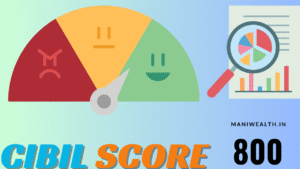CIBIL Score: More Than Just a Number! 
In today’s world, having a “score” isn’t limited to exams or app ratings—it’s also part of your financial identity. For many salaried individuals, especially employees in private companies, the CIBIL score has become a badge of pride. It’s common to hear someone say, “My CIBIL score is 750 plus!” When asked why they’re so proud of it, the confident reply is often, “With this score, I can get any loan instantly!”
But here’s the truth—there is no direct and guaranteed link between a high CIBIL score and loan approval. Surprised? You’re not alone. Let’s explore what a CIBIL score really means and why it’s only part of the bigger picture.
What is a CIBIL Score Anyway? Why a High CIBIL Score
The CIBIL score reflects the creditworthiness of an individual. It is based on one’s Permanent Account Number (PAN) and changes over time depending on your loan history and repayment behavior. This score is managed by the Credit Information Bureau India Limited (CIBIL), and banks refer to it when deciding whether to sanction a loan.
However, a good score doesn’t automatically mean your loan will be approved. Similarly, a low or even zero score doesn’t always mean rejection. To understand this better, let’s look at the real-life example of Avinash and Anudeep.
A Tale of Two Salaries: Avinash vs. Anudeep Why a High CIBIL Score

Avinash and Anudeep are colleagues at a private company, each earning ₹60,000 a month.
-
Avinash is conservative with money—he saves about 10% of his monthly expenses and avoids credit cards altogether.
-
Anudeep, on the other hand, has taken out a personal loan, uses two credit cards, and even has a loan against one of those cards.
Both wanted to buy a house and approached banks for a home loan. Their financial snapshots were quite different:
-
Avinash’s CIBIL score was zero—he had no prior loans or credit card usage.
-
Anudeep had a CIBIL score of 820, thanks to his consistent loan and credit card payments.
Here’s the twist: Avinash’s loan was approved, while Anudeep’s was rejected.
Why?
Despite his excellent score, Anudeep was spending over half his income just to repay his existing debts, leaving little room to handle a new loan EMI. The bank saw this as a risk. On the other hand, Avinash had no financial liabilities, and based on his stable salary and savings habits, the bank approved his loan—even with a score of zero.
This incident is a powerful reminder: a CIBIL score is not everything.
Should You Check Your CIBIL Score Often?
You may have received promotional messages from private companies saying, “Check your CIBIL score now!” It’s not wrong to check it once in a while, but doing it too often is not recommended.

The credit report will show all your credit cards, loans, payment history, and more—but just knowing this won’t always help you. Plus, frequent checks can compromise your privacy if done through insecure platforms.
So, if bank loans and CIBIL scores are not directly tied, why stress about the score? The real focus should be on healthy repayment habits.
The Real Impact of Repayments on Your CIBIL Score
The CIBIL score works like a point system:
-
Every on-time EMI payment increases your score.
-
Every delayed or missed payment decreases it.
But here’s the nuance—many people pay their secured loans (like home or car loans) on time but delay or miss payments on unsecured loans (like personal loans or credit cards). This inconsistent behavior can cause serious fluctuations in the CIBIL score.
And even if someone is regular with secured loan repayments, inconsistency in unsecured loan payments can lead to loan rejections for future needs like children’s education or emergencies.
In Conclusion: Focus on Financial Discipline
CIBIL score is important, yes—but it’s not the holy grail of financial health. You don’t need to chase a score of 850+ if it comes at the cost of poor budgeting or over-leveraging your income.
The golden rule?
Pay your EMIs on time, borrow within your means, and live with financial discipline.
That’s more powerful than any number on a credit report.
Extra Tips to Understand and Maintain a Healthy Credit Profile
1. Use Credit Responsibly – Don’t Avoid It Entirely
While Avinash had no CIBIL score and still got a loan, that won’t always work. A zero score is not the same as a good score—it simply means you’re a “new-to-credit” customer.
✅ Tip: Use one credit card wisely. Make small purchases and pay the full bill before the due date. This builds a healthy credit history.
Example: Meena, a schoolteacher, uses her credit card only for groceries and fuel. She pays her bill in full every month. Over time, she builds a solid CIBIL score above 780, without ever being in debt.
2. Don’t Apply for Multiple Loans or Cards at Once
Each loan or credit card application triggers a “hard inquiry”. Too many of these in a short span can lower your CIBIL score and make you look credit-hungry.
✅ Tip: Apply for credit only when necessary and space out your applications.
Example: Raj applied for a car loan, two credit cards, and a personal loan within two months. Even though he had a score of 770, lenders saw this as risky behavior and rejected his home loan application.
3. Avoid Minimum Payments on Credit Cards
Paying only the minimum amount due on a credit card might keep your account active, but interest keeps piling up. This can lead to debt traps and hurt your score if you miss payments later.
✅ Tip: Always pay credit card dues in full or as much as possible before the due date.
Example: Priya used to pay just the minimum on her ₹20,000 credit card bill. After six months, she owed ₹35,000 due to accumulated interest and late fees, which damaged her score.
4. Keep Your Credit Utilization Ratio Below 30%
Using more than 30–40% of your available credit limit regularly signals financial stress to lenders.
✅ Tip: If your credit limit is ₹1,00,000, try not to spend more than ₹30,000 on it each month.
Example: Arvind had a credit limit of ₹1,20,000 and used up ₹1,00,000 every month. Even though he paid on time, the high utilization negatively impacted his score.
5. Avoid Joint Loans or Being a Guarantor Without Caution
If you co-sign a loan or become a guarantor, their default becomes your problem too—and your score could suffer.
✅ Tip: Co-sign loans only for people you completely trust and whose repayment behavior you know well.
Example: Sunil co-signed a personal loan for his cousin. His cousin defaulted after six months. Even though Sunil never borrowed a rupee, his CIBIL score dropped to 630.
Additional Example You Can Use to End Strongly
“Your CIBIL score is like your financial fingerprint. It tells a story—not just of how much you earn, but of how wisely you manage it. Just like a clean kitchen doesn’t mean you’re a good cook, a high CIBIL score doesn’t always mean you’re financially healthy. It’s your habits that count.”
✨ About Me
Hi! I’m Manikanta Reddy, a passionate finance enthusiast with a strong understanding of money management, personal finance, and smart investment strategies. I believe financial literacy is the foundation of a secure and stress-free life — and I’m here to share practical insights, real-life examples, and simplified advice to help you make better financial decisions.
Whether it’s choosing between paying off a loan or investing, building emergency funds, or planning for retirement — I love breaking down complex topics into easy, actionable tips that anyone can follow.
Let’s learn, grow, and build wealth — the smart way. 💰






1 thought on ““Why a High CIBIL Score Isn’t a Loan Guarantee: The Truth About Credit Scores and Financial Discipline””